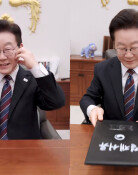NK Defectors Sending Money to Relatives in N. Korea
NK Defectors Sending Money to Relatives in N. Korea
Posted October. 29, 2009 08:54,
Many North Korean defectors send part of what they earn in South Korea to their relatives in North Korea, the results of a survey conducted by The Dong-A Ilbo said yesterday.
Forty-one defectors (20.5 percent) said they send money to North Korea either to bring their families to South Korea or cover their living expenses in North Korea. Given the number of defectors unwilling to give answers, the figure is seen as higher.
A member of a civic group working for defectors in Seoul said, Its safe to say that all North Korean defectors with relatives in the North send money to the impoverished country.
Seventeen defectors said they send an average of 2.06 million won (2,725 U.S. dollars) to the North every year.
Among some 17,000 defectors living in South Korea, if 5,000 are assumed to send two million won (1,675 dollars) per year to their relatives in the North, 10 billion won (8.38 million dollars) of such funds are sent every year. This is more than half of the 19.7 billion won (16.5 million dollars) Seoul sent to Pyongyang in humanitarian aid last year.
Subsidies given to defectors for resettlement are sent to the North. Of 200 defectors who participated in the survey, 27 said they pay part of their subsidies to brokers for bringing their relatives in the North to the South. A survey by the North Korean Human Right Information Center said 24 percent of defectors use their subsidies to hire brokers.
Yun Seong-sik, 39, who fled the North while leaving his wife and daughter behind, came to South Korea via China and Vietnam. He said he paid 14 million won (11,725 dollars) to a broker to bring his family to the South through China.
The South Korean government provided money to help me stand on my own feet before getting a job, but I spent all the subsidies to bring my family to South Korea, he said.
Pak Gyu-min, 44, has been sending money to his wife in the North. Though Ive nothing to spend on here, Ive saved nothing because I send money to the North, he said.
Defectors send money to the North through brokers, who get a commission of 30 percent and use bank accounts in South Korea.
Yoo Seon-yeong, 30, who has been sending money to her parents in the North over the past five years since arriving in the South, said, Chinese brokers open bank accounts in South Korea through ethnic Korean living here, adding, If money is transferred via Internet banking, they instantly check the transfer.
Chinese brokers then sent money to the families of their clients via smugglers or Chinese merchants.
Over the Chuseok holidays this year that began Oct. 2, Kim Nam-suk, 41, held a ritual for her late brother, who died of an illness last year in the North.
He often appears in my dream as if he regrets having died without seeing me, she said.
The last holiday she spent with her family in the North was Lunar New Years Day in 2002. Kim said she was happy when all seven of her siblings got together, though they had little to eat.
Kim said she had many photos of her family at home in the North. I couldnt take any pictures out of fear of being caught, but my nephews and nieces who fled the North after me gave me the pictures, she said.
Her immediate family remains in the North. Kim said her sister made an unsuccessful attempt to flee.
Though Kim barely makes a living for her two children by working at a restaurant, she said she must send funds to her family in the North twice a year between one million and 1.5 million won (838 to 1,256 dollars). The sum is enough to feed her parents in the North.
Kim observed a modest ritual with steamed rice and meat stew for her brother. My wish is to prepare steamed rice for my parents before they die, she said in tears.





![술의 위기, 범인은 넷플릭스와 위고비? [딥다이브]](https://dimg.donga.com/c/138/175/90/1/wps/NEWS/IMAGE/2026/02/27/133435221.1.jpg)

